Submitted:
28 June 2024
Posted:
01 July 2024
You are already at the latest version
Abstract
Keywords:
I. INTRODUCTION
II. RELATED WORK
A. Agile Software Development: Methodologies and Trends by Samer Sawalha and Hiba Abdel Nabi (2020)
B. Agile Software Development Methods: Review and Analysis by Pekka Abrahamsson, Outi Salo, Jussi Ronkainen and Juhani Warsta (2017)
- 1)
- Human Relationships and Team Spirit: Emphasizing the importance of relationships and community among software developers, agile practices foster close team relationships and working environments, prioritizing hu- man roles over institutionalized processes and tools.
- 2)
- Continuous Delivery of Working Software: Agile teams aim to produce tested, working software at frequent intervals. This approach encourages keeping the code simple and advanced, reducing the documentation bur- den.
- 3)
- Developer-Client Cooperation: Agile methods prioritize collaboration between developers and clients over strict contracts. Negotiation is seen as a means to maintain a viable relationship, focusing on delivering business value immediately and reducing non-fulfillment risks.
- 4)
- Flexibility and Competence: Agile teams, including both developers and customer representatives, should be well- informed, competent, and authorized to make necessary adjustments during the development life-cycle. Contracts should support and allow for these enhancements [3].
C. Improving Warehouse Operation Digitally by Felipe Busta- mante, Ashutosh Dekhne, Jo¨rn Herrmann, and Vedang Singh (2020)
D. Manifesto for Agile Software Development by Kent Beck, Mike Beedle, Arie van Bennekum, Alistair Cockburn, Ward Cunningham, Martin Fowler, James Grenning, Jim Highsmith, Andrew Hunt, Ron Jeffries, Jon Kern, Brian Marick, Robert
E. Martin, Steve Mellor, Ken Schwaber, Jeff Sutherland, and Dave Thomas (2001)
F. Warehouse Management System for Smart Digital Order Picking Systems by Dina Fitria Murad, Bambang Dwi Wija- narko, Widya Ratnasari, and Bhumyamka Yala Saputra (2019)
III. METHODOLOGY
A. Search
B. Objective
| Characteristic | Sub-Characteristic |
|---|---|
| Functional Suitability |
Functional Completeness, Functional Correctness, Functional Appropriatness |
| Perfomance Ef- ficiency |
Time Behavior, Resource Utilization, Capacity |
| Compability | Co-existence, Interoperability |
| Usability | Appropriateness, Recognizability, Learnability, Oper- ability, User Error Protection, User Interface Aesthet- ics, Accesibility |
| Integrity | Non-repudiation, Authenticity, Accountability |
| Maintability | Modularity, Reusability, Analysability, Modifiability, Testability |
| Portability | Adaptability, Installability, Replaceability |
C. Data Collection and Design
D. Data Analysis and Evaluation
E. Validation
IV. RESULT AND DISCUSSION
A. Result
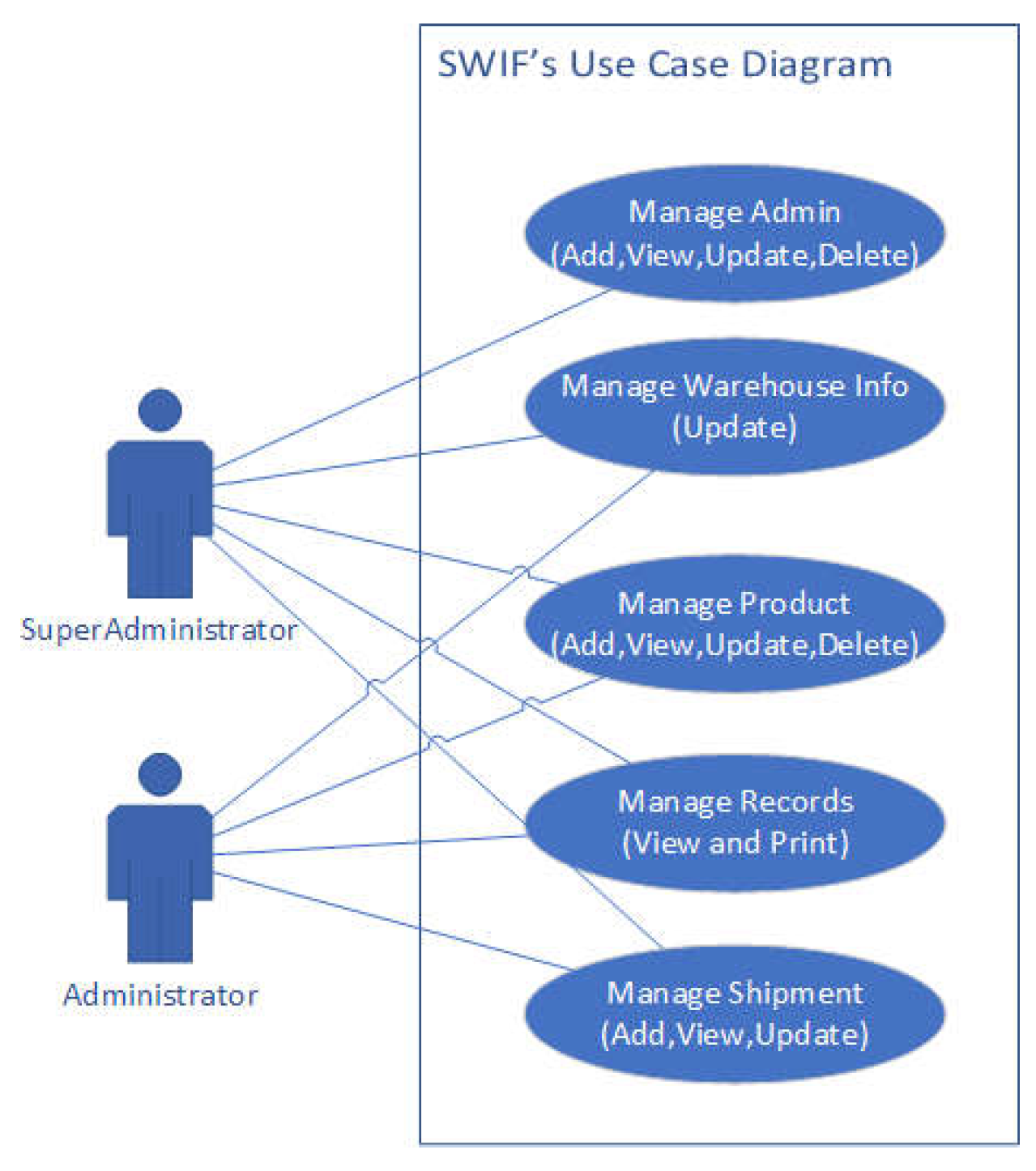
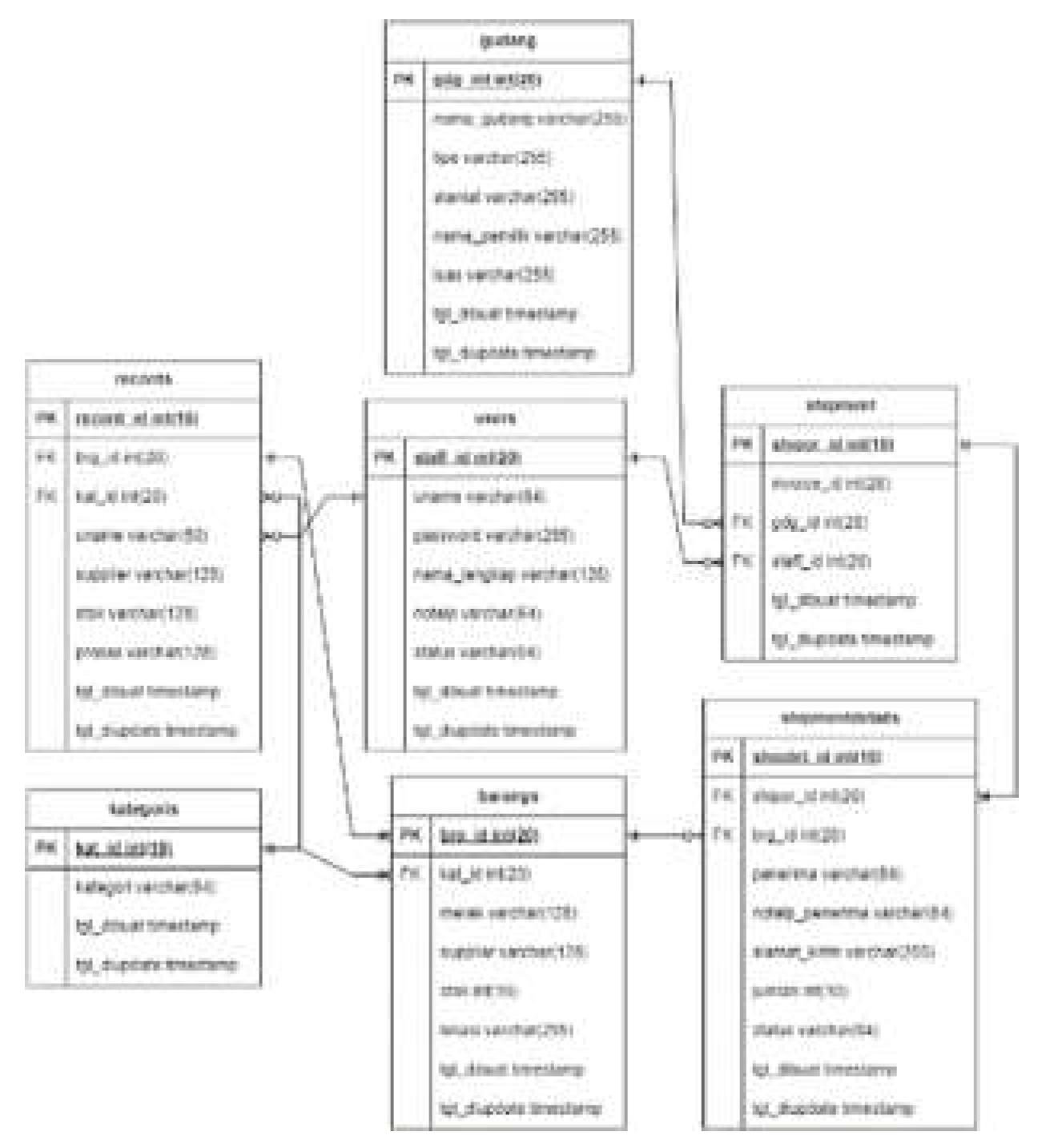
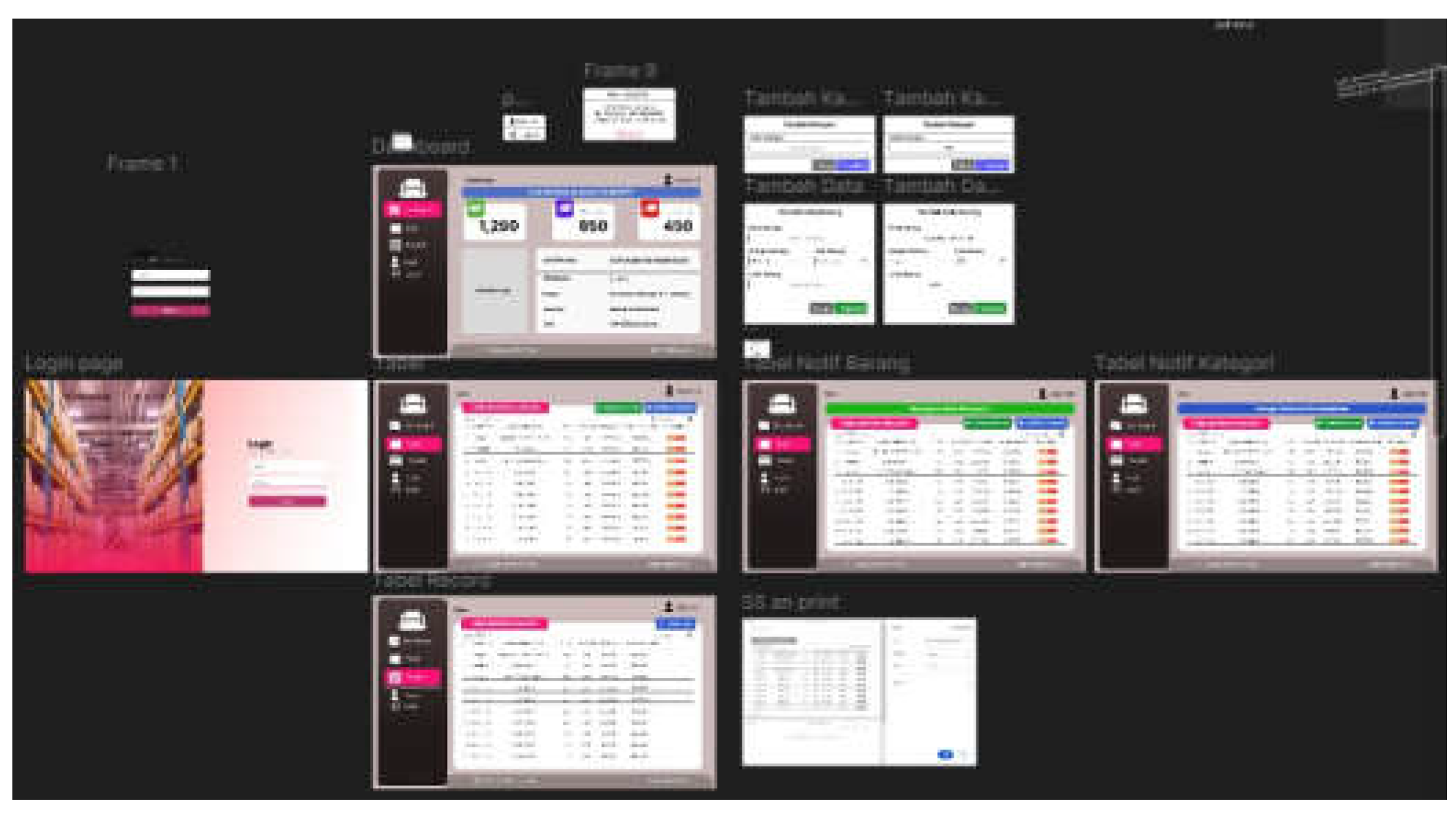
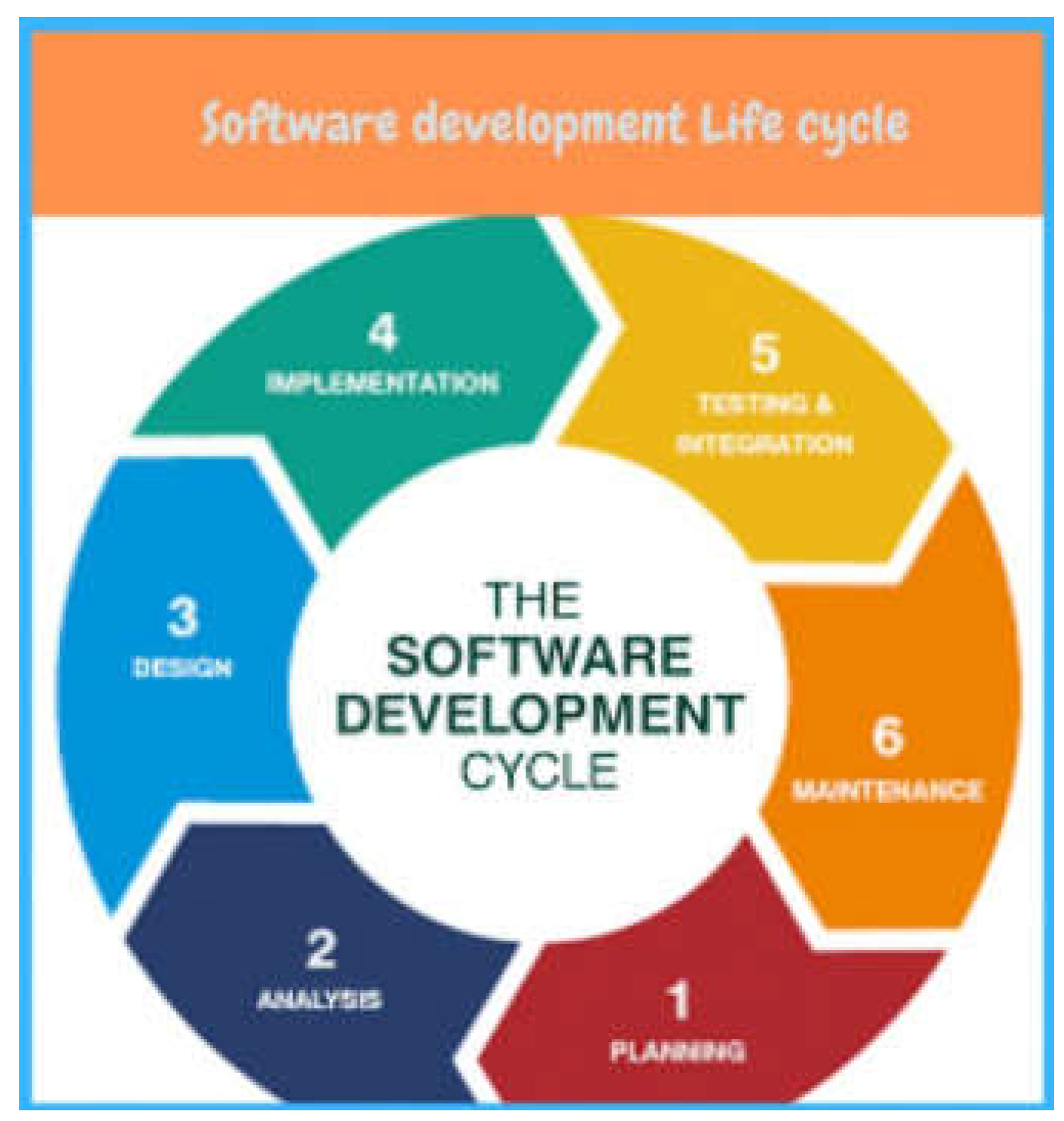

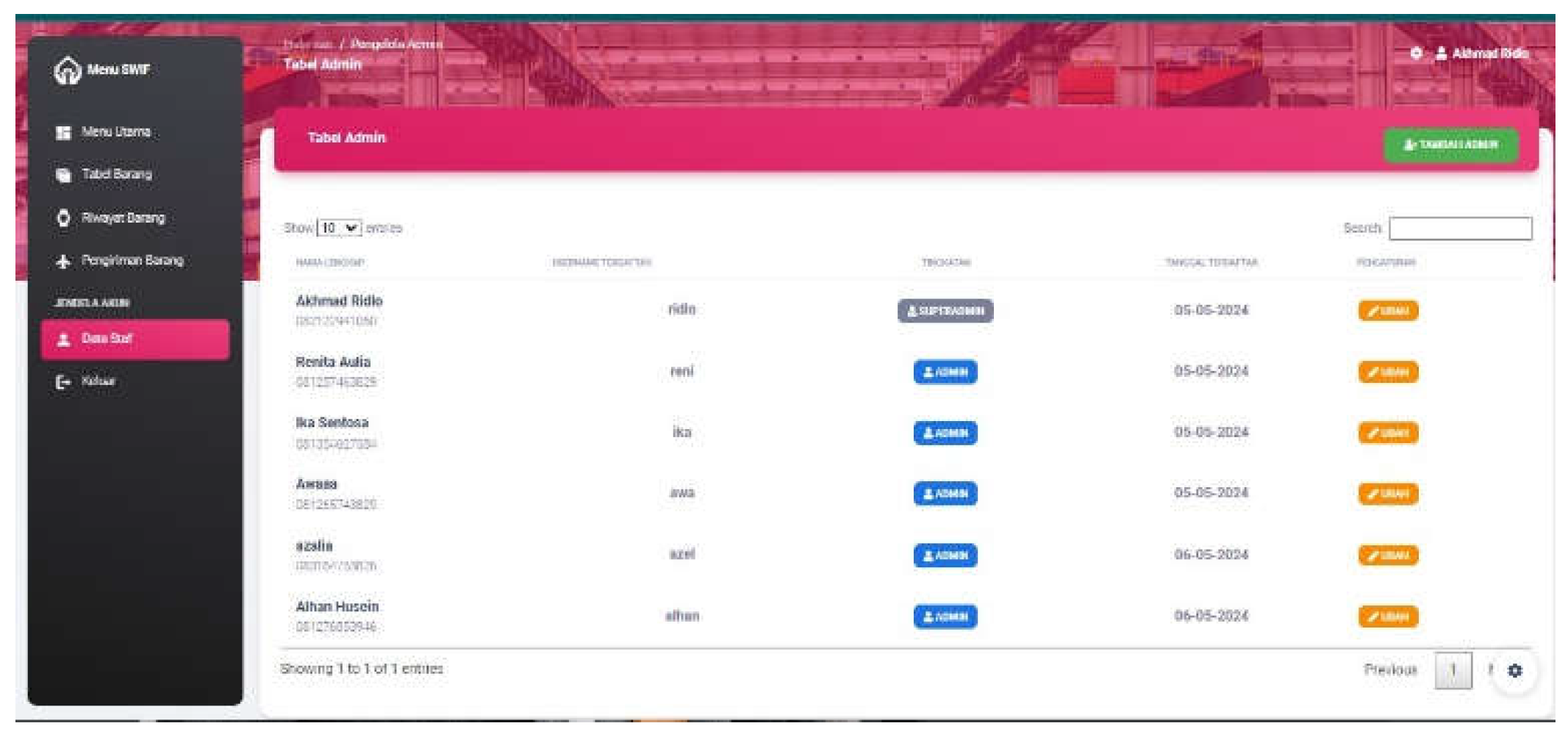
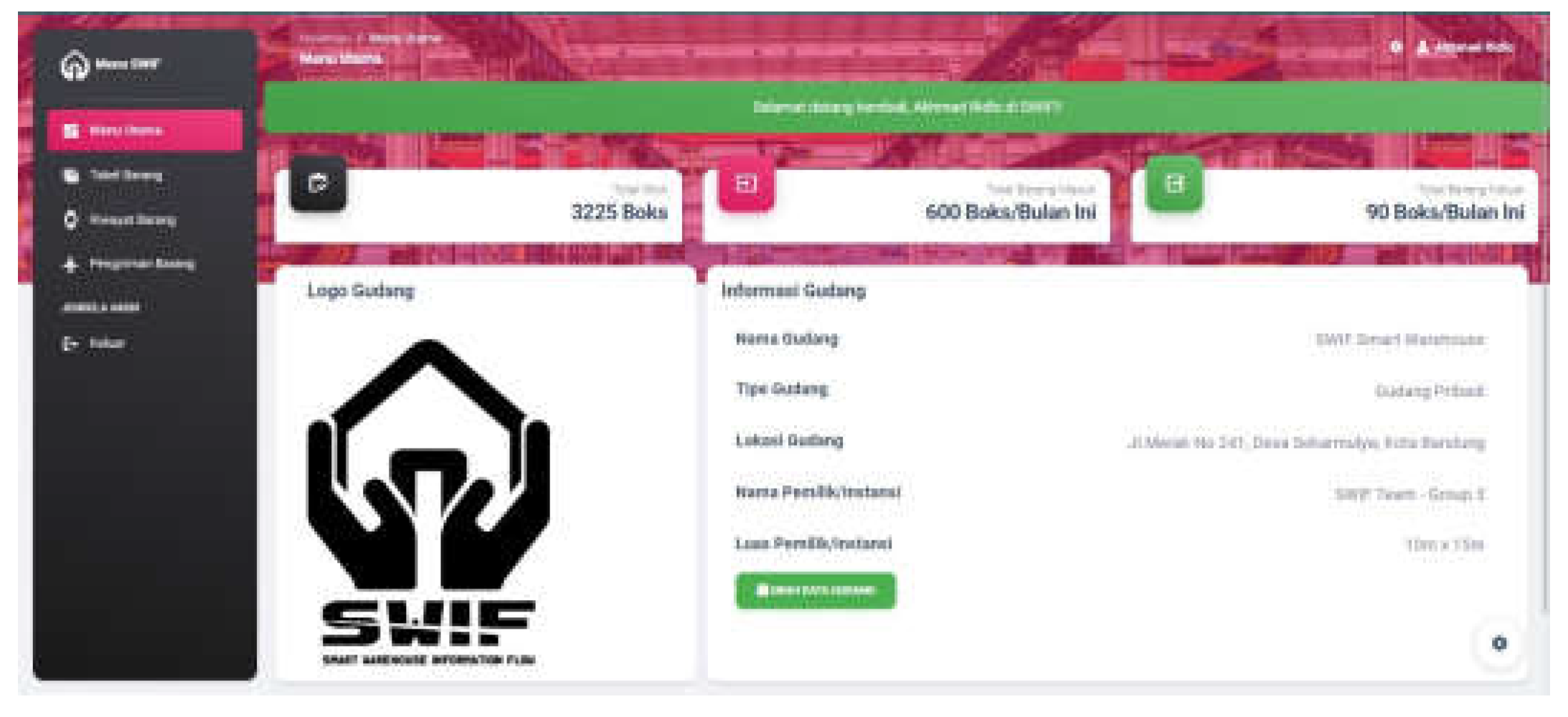
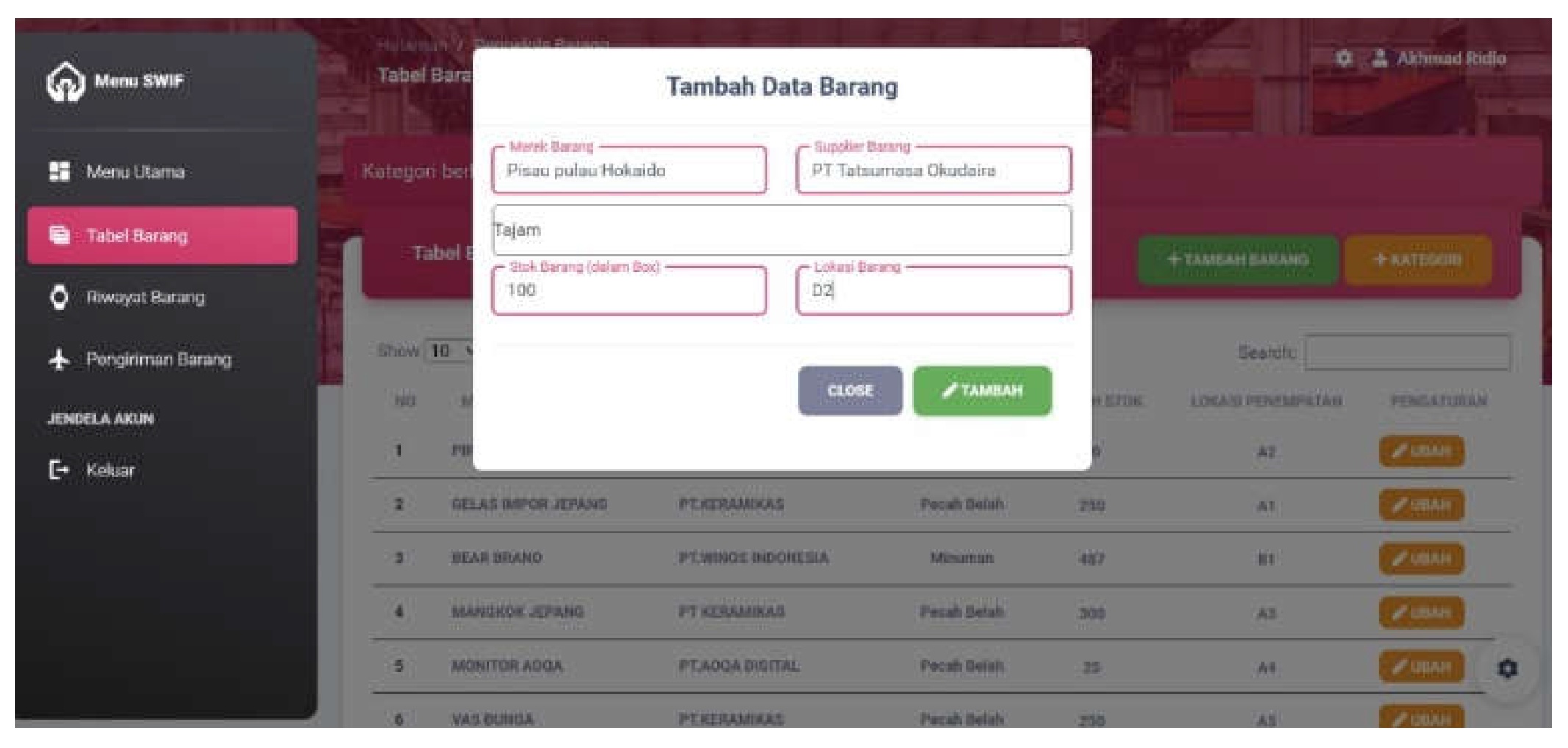

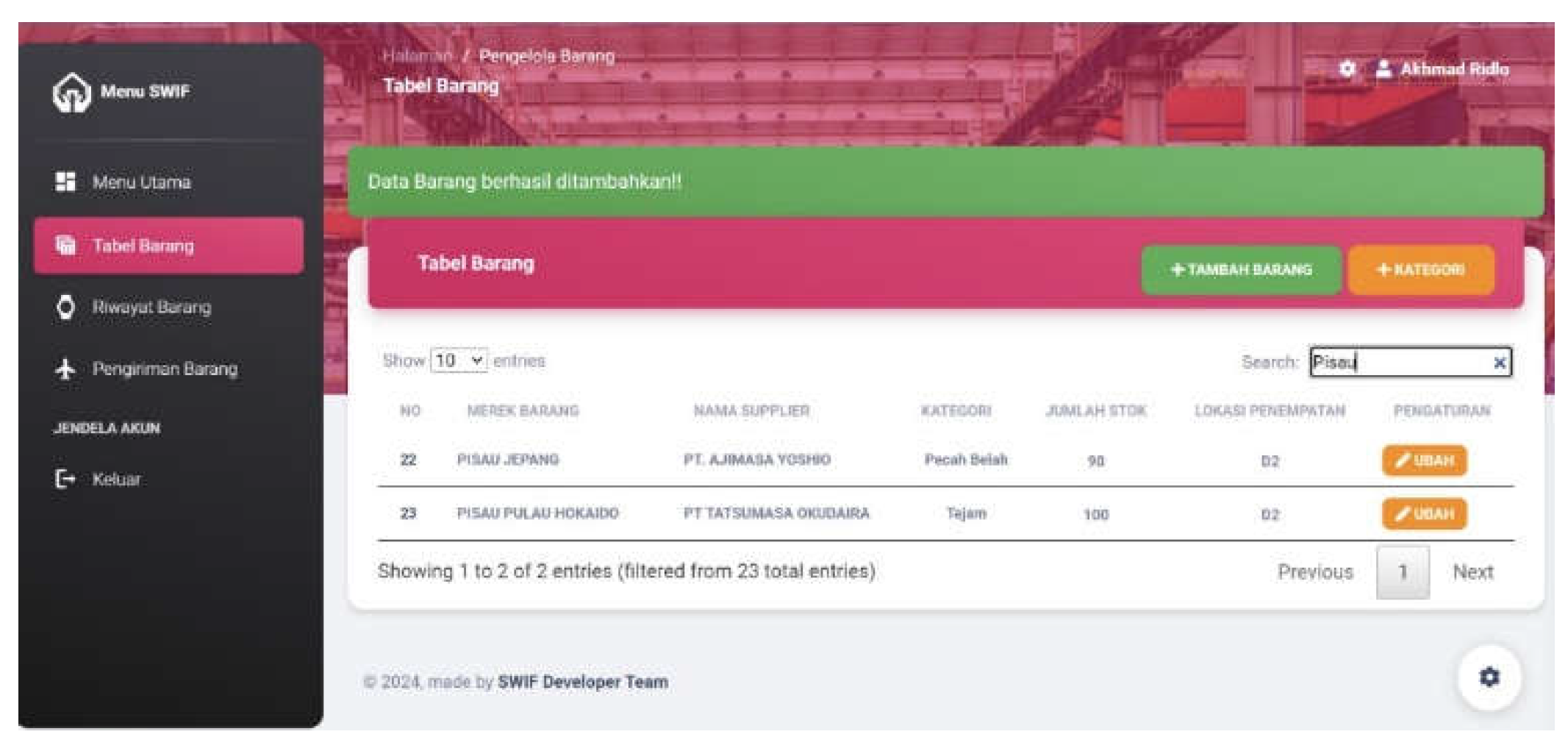
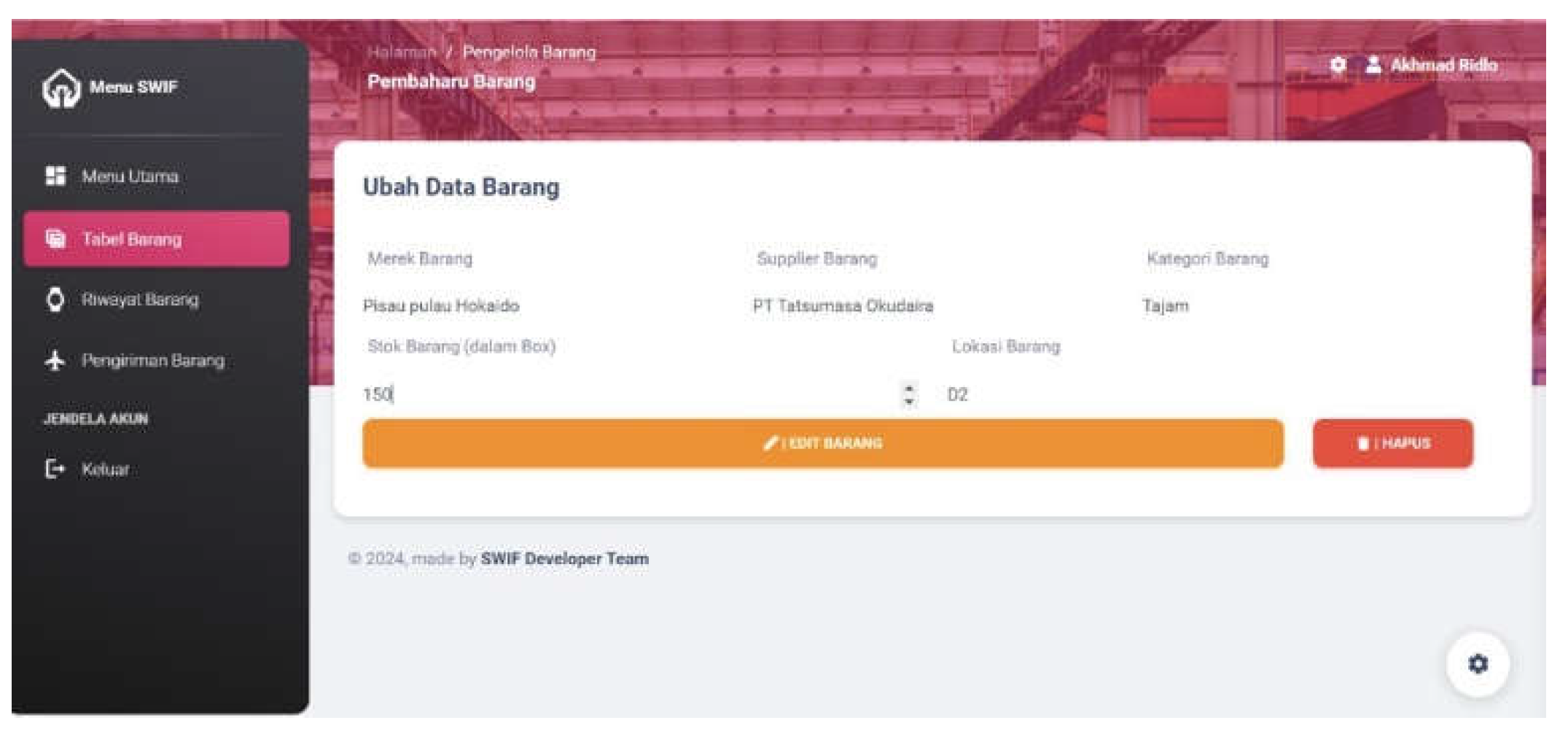
| Cycle | Implementation |
|---|---|
| Planning | Defining the Scope and Setting the Stage: The planning phase lays the foundation for the project, outlining the features, pages, budget, timeline, and team size. For SWIF, this involved: 1. Features: - Data management (inbound and outbound) - Streamlined stock adjustments through an interface - Automated data recording across various processes - Comprehensive shipment tracking capabilities - PDF report generation of data records - Invoice generation based on shipment details - Real-time stock level tracking - Robust privilege-based access control system (staff and super admin roles) 2. Pages: - Login page - Record page - Table page - Dashboard page - Item notification table page - Category notification table page - Add category page - Add data page 3. Budget: Zero budget (utilizing available resources) 4. Timeline: 4 months 5. Team Group: 6 people |
| Analysis | Understanding Requirements and Leveraging Existing Designs: The analysis phase delves into the details of each feature, ensuring a clear understanding of requirements and utilizing existing designs. For SWIF, this included: 1. Analyzing existing designs: - Login page (Figma) - Admin page (Figma) - Dashboard (Figma) 2. Defining field requirements: - User authentication for login - Data fields for record page and table page - Dashboard metrics - Notification table fields 3. Reviewing database: Existing MySQL database structure 4. Ensuring design consistency: Aligning all pages with functional requirements and Figma designs |
| Design | Creating the Blueprint and Selecting Technologies: The design phase translates requirements into a detailed blueprint, encompassing business rules, layouts, themes, and frameworks. For SWIF, this involved: 1. Establishing business rules: - Access control permissions - Data validation rules - Stock adjustment procedures 2. Designing layouts: - User-friendly interfaces for all pages - Consistent design language across the application 3. Selecting themes: Color schemes and typography that align with the brand identity 4. Choosing frameworks: - Front-end frameworks for building responsive and interactive interfaces (Bootstrap 5) - Back-end frameworks for efficient development (Laravel 8) |
| Implementation | Bringing the App to Life: The implementation phase brings the design to life, developing the application code, testing it for functionality, and integrating it with the backend infrastructure. For SWIF, this included: 1. Backend development: - Setting up servers and databases - Implementing APIs for data exchange - Creating physical data models 2. Ensuring code quality: - Following best practices for code structure and maintainability - Conducting unit tests to verify individual components 3. Integrating frontend and backend: - Connecting the UI/UX elements to the backend functionalities - Ensuring seamless data flow between the frontend and backend |
| Testing | Ensuring Quality and Bug-Free Operation The testing phase rigorously scrutinizes the application to identify and fix bugs, ensuring it meets quality standards. For SWIF, this involved: 1. Thorough testing: - Unit testing for individual components - Integration testing for inter- component interactions - System testing for overall functionality - User acceptance testing to gather feedback from potential users 2. Bug identification and resolution: - Identifying and tracking bugs throughout the testing process - Implementing fixes and re-testing to ensure bug-free operation 3. Quality assurance: - Ensuring the application meets all defined quality criteria - Addressing any performance or usability issues |
| Maintenance | Continuous Improvement and Support: The maintenance phase ensures the application’s long-term health, addressing issues, implementing enhancements, and ensuring team alignment. For SWIF, this involves: 1. Performance monitoring: - Tracking application performance metrics - Identifying and resolving performance bottlenecks 2. Issue resolution: - Responding promptly to user reported issues - Implementing bug fixes and patches 3. Continuous improvement: - Gathering user feedback and suggestions - Prioritizing and implementing enhancements to improve the application |
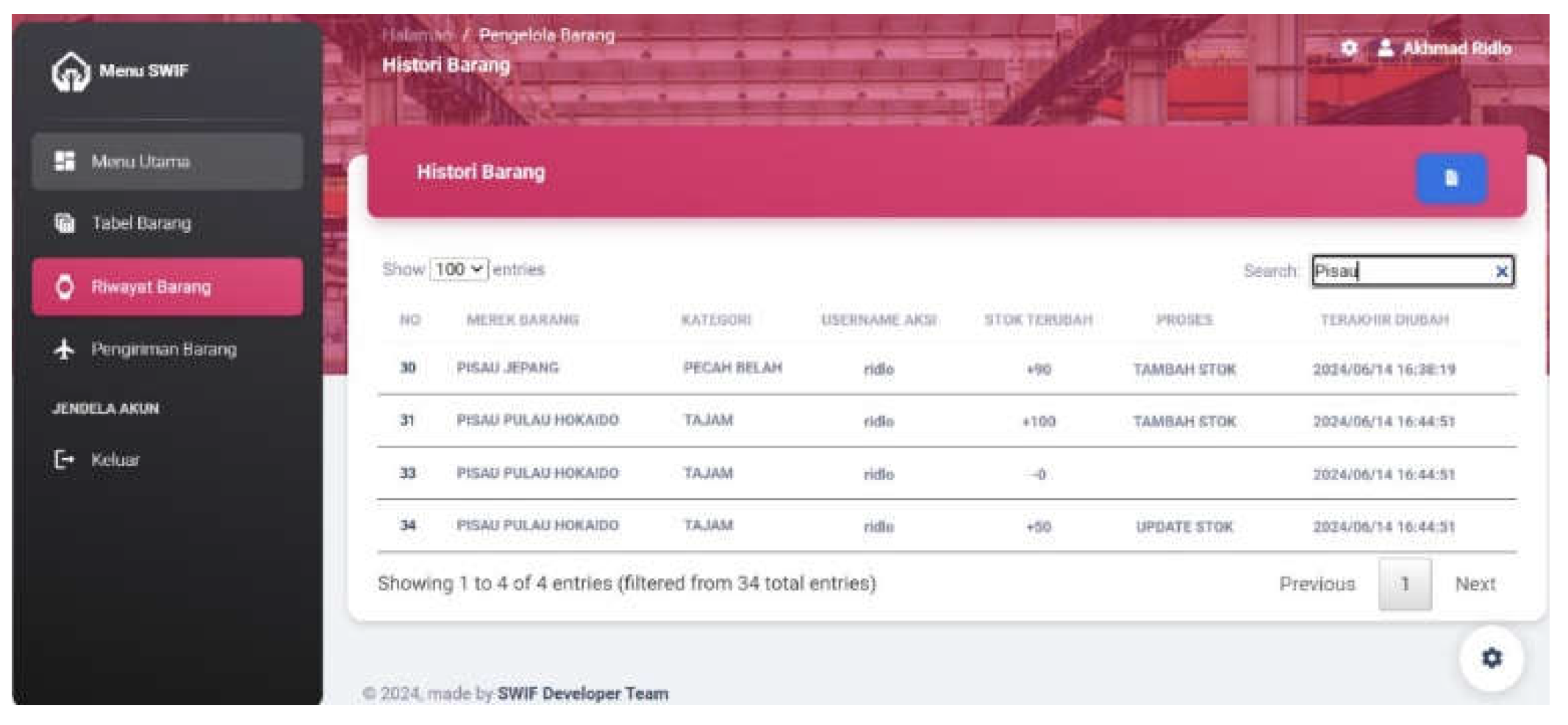

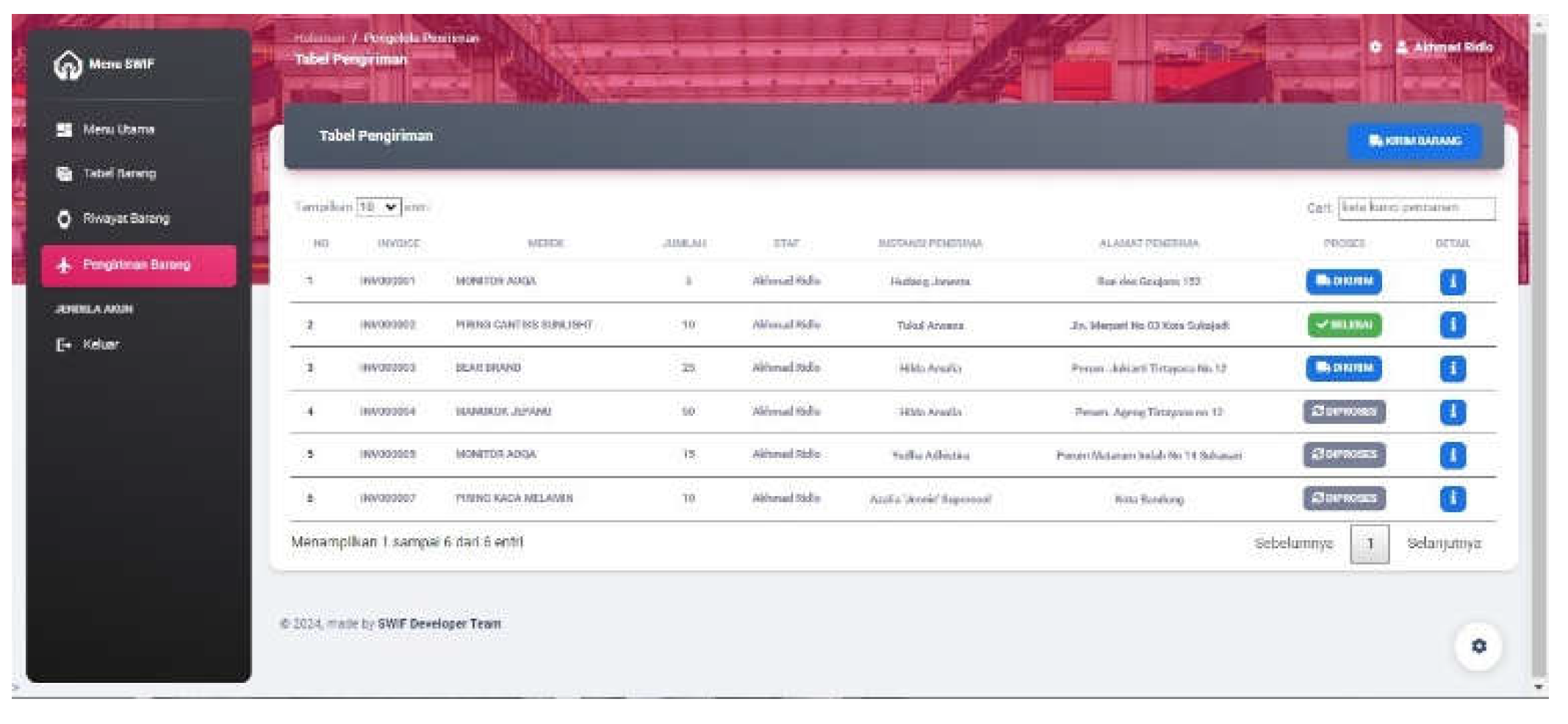
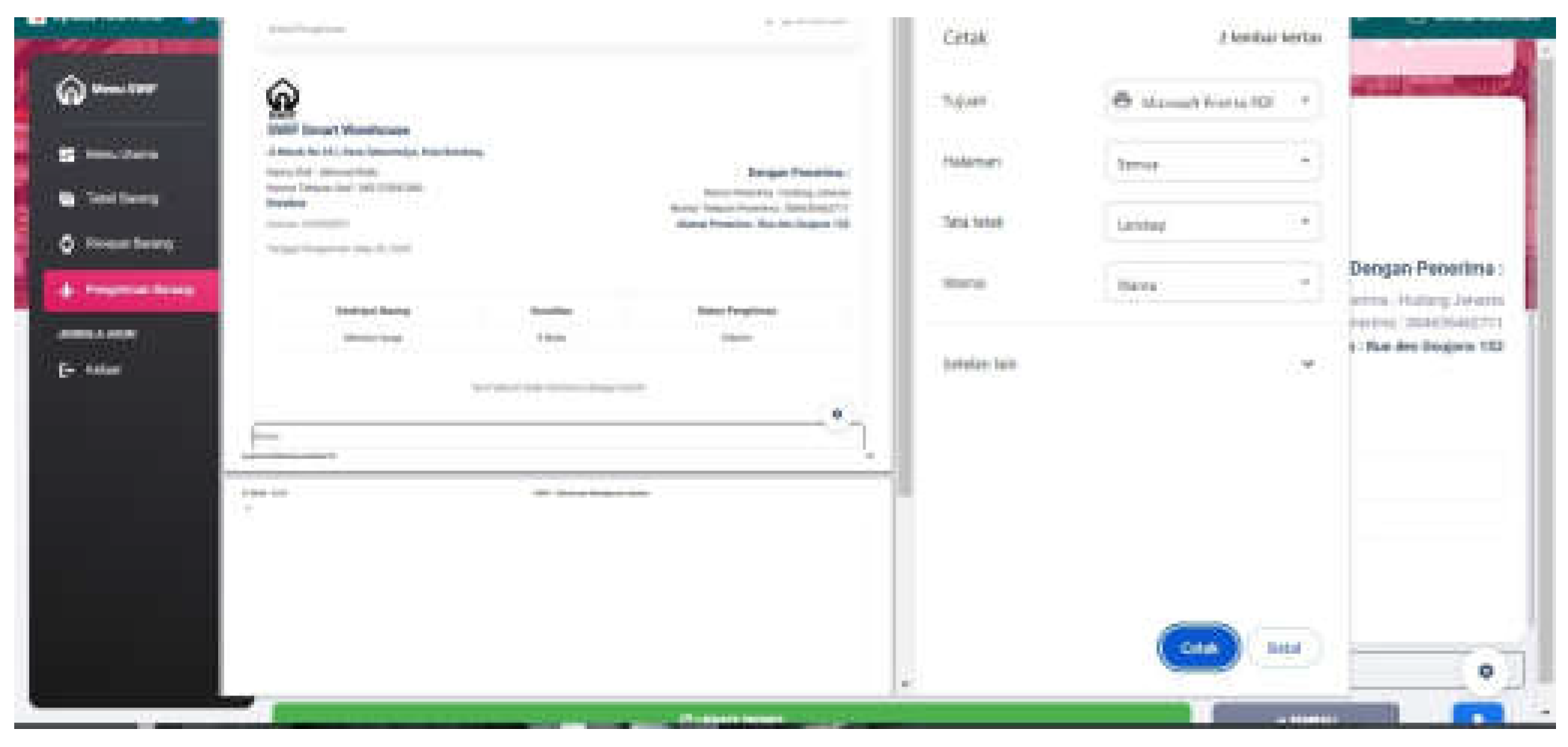
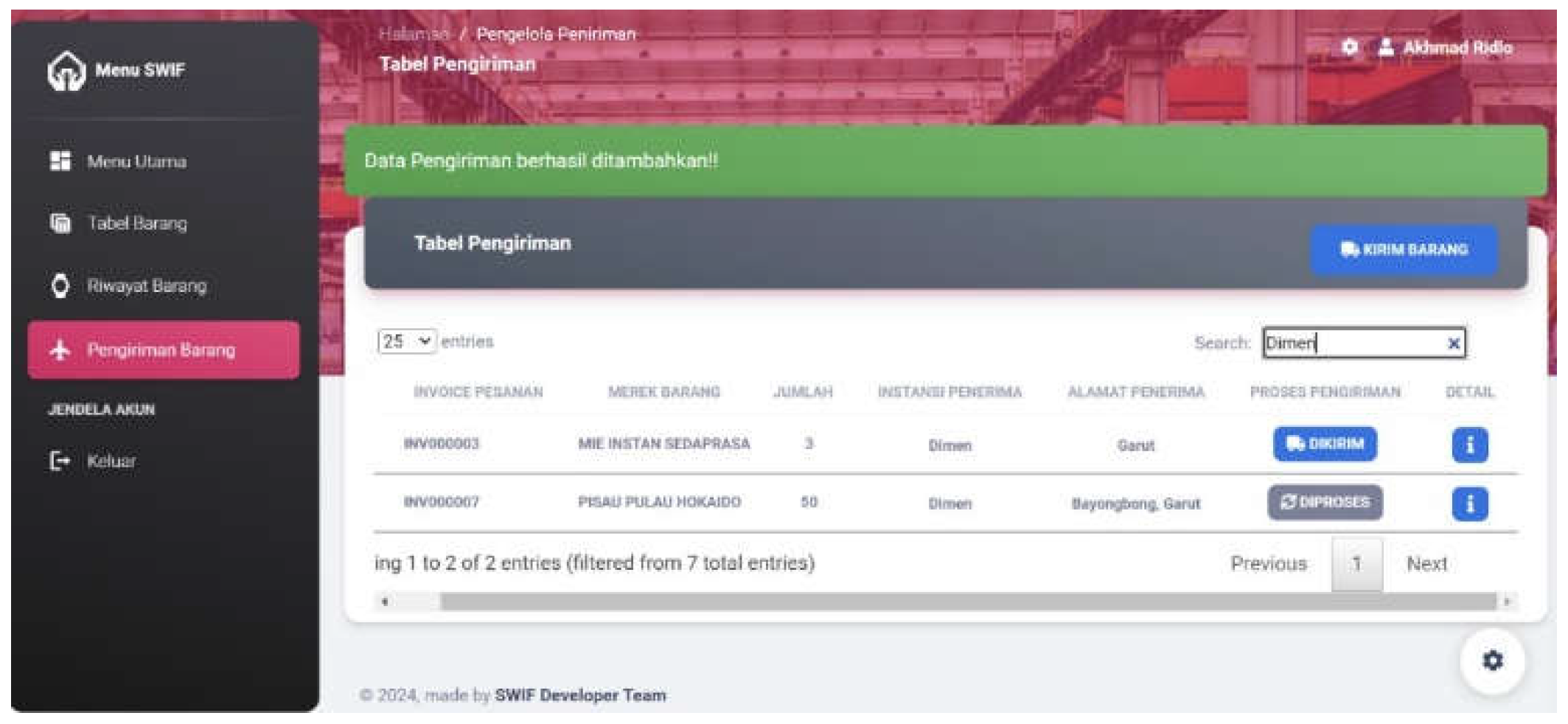

A. Discussion
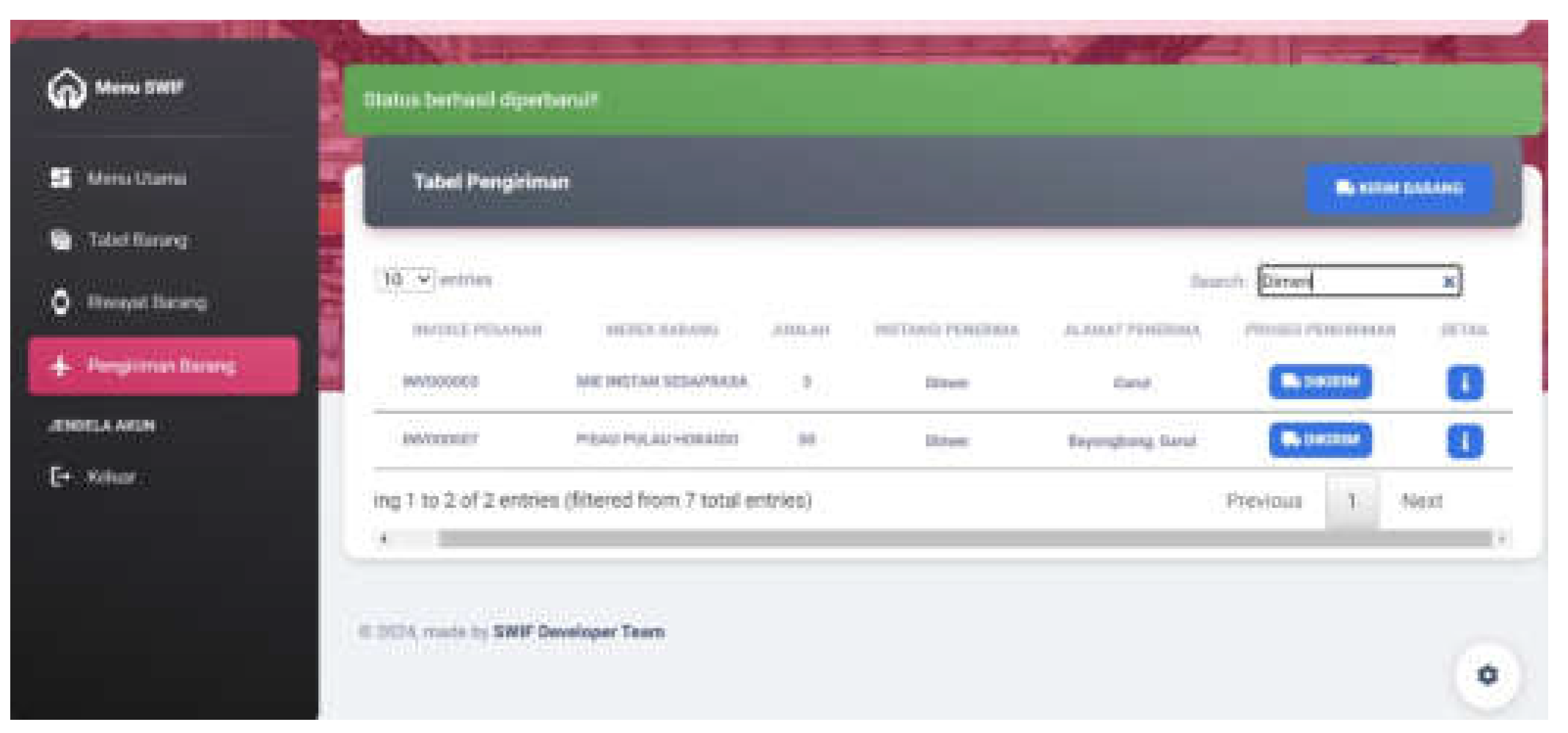
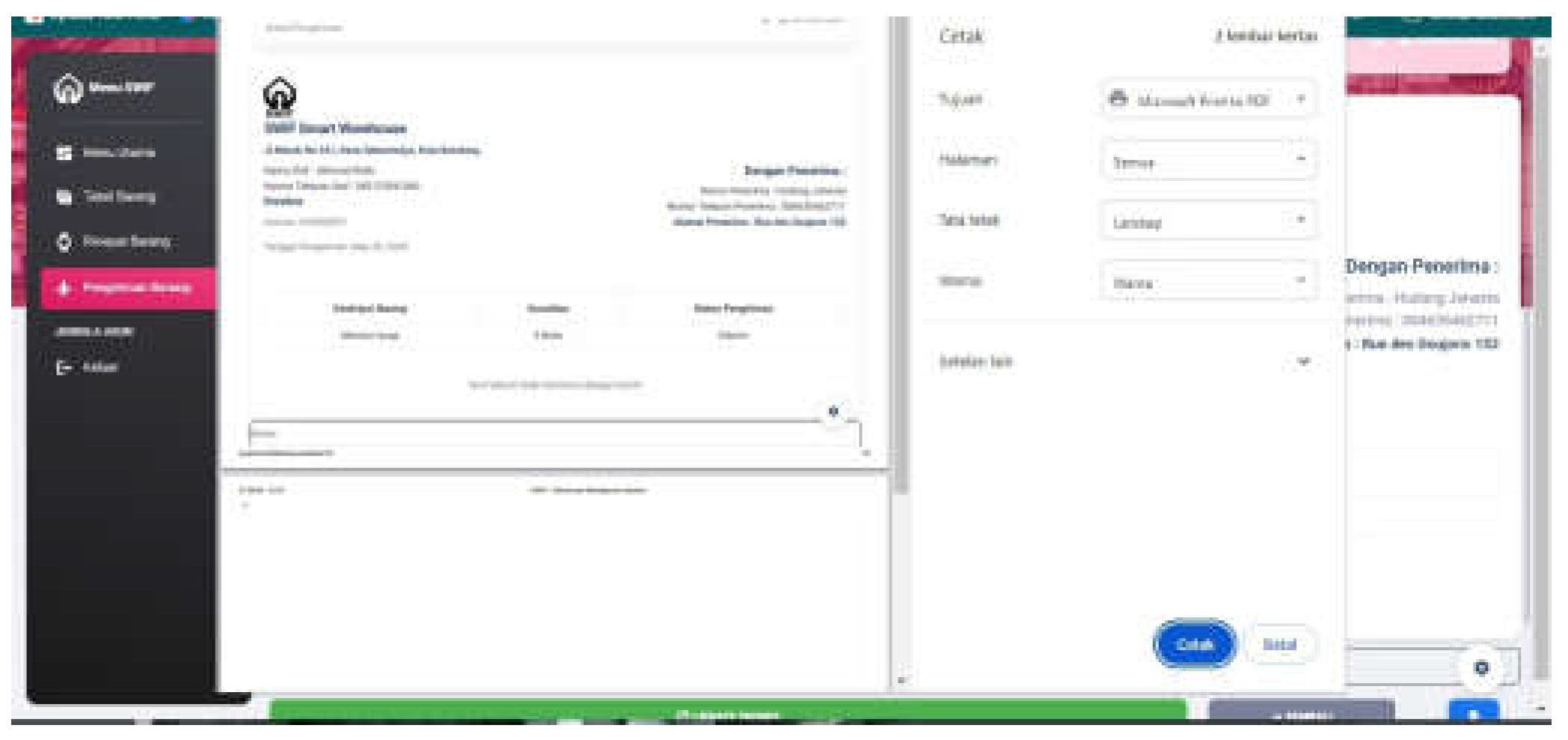
V. CONCLUSIONS
Acknowledgment
References
- Pereira, J.C.; de F, R. “Design thinking integrated in agile software development: A systematic literature review,” Procedia Computer Science, vol. 38, pp. 775– 782, 2018, cENTERIS 2018 - International Conference on ENTERprise Information Systems / ProjMAN 2018 - International Conference on Project MANagement / HCist 2018 - International Conference on Health and Social Care Information Systems and Technologies, CENTERIS/ProjMAN/HCist 2018. [Online]. Available: https://www.sciencedirect.com/science/article/pii/S1877050918317484.
- Al-Saqqa, S.; Sawalha, S.; AbdelNabi, H. “Agile software develop- ment: Methodologies and trends.” International Journal of Interactive Mobile Technologies 2020, 14.
- Abrahamsson, P.; Salo, O.; Ronkainen, J.; Warsta, J. R: soft- ware development methods; arXiv:1709.08439, 2017.
- Bustamante, F.; Dekhne, A.; Herrmann, J.; Singh, V. “Im- proving warehouse operations—Digitally,” McKinsey & Company, available at: https://www. mckinsey. com/capabilities/operations/our- insights/improving-warehouse-operations-digitally, 2020.
- Manifesto, A. “Manifesto for agile software development,” 2001.
- Murad, D.F.; Ratnasari, W.; Saputra, B.Y.; Wijanarko, B.D. “Ware- house management system for smart digital order picking systems,” IJNMT (International Journal of New Media Technology 2019, 6, 74–80, 2019.
- Lo, L.; Burgue, X.; Mart, S.; Vollmer, A.M.; Be- hutiye, W.; Karhapa, P.; Rodr, X.F.P.; Oivo, M. “Quality measurement in agile and rapid software development: A systematic mapping,” Journal of Systems and Software 2022, 186, 111187. 186.
- Petersen, K.; Vakkalanka, S. ; L. uzniarz, “Guidelines for conducting systematic mapping studies In software engineering: An update,” Information and Software Tech- nology, vol. 64, pp. 1–18, 2015. [Online]. Available: https://www.sciencedirect.com/science/article/pii/S0950584915000646.
- Effendy, G.Y.; Suherman, I.C.; Adianto, A.I.; Handayani, F. ; muchammad arief wujdi; Aini, N. “Pentingnya menelaah macam- macam kesalahan rekayasa perangkat lunak,” Journal of Information Engineering and Educational Technology, vol. 2, no. 2, 2019. [Online].
- Available: https://api.semanticscholar.org/CorpusID:127788094.
- Singh, K. “Agile methodology for product development: A conceptual study,” International Journal of Recent Technol- ogy and Engineering, vol. 10, 2021. [Online]. Available: https://api.semanticscholar.org/CorpusID:236403099.
- Ghozali, R.P.; Saputra, H.; Nuriawan, M.A. ; Suharjito; Utama, D. N.; Nugroho, A. “Systematic literature review on decision- making of requirement engineering from agile software development,” Procedia Computer Science 2019, 157, 274–281, the 4th International Conference on Computer Science and Computational Intelligence (ICCSCI 2019) : Enabling Collaboration to Escalate Impact of Research Results for Society. [Online]. Available: https://www.sciencedirect.com/science/article/pii/S1877050919310853. [Google Scholar]
- Alami, A.; Krancher, O.; Paasivaara, M. “The journey to technical excellence in agile software development,” Information and Software Technology 2022, 150, 106959. [Online]. Available: https://www.sciencedirect.com/science/article/pii/S0950584922001021.
- Ouriques, R.; Wnuk, K.; Gorschek, T.; Svensson, R.B. “The role of knowledge-based resources in agile software development contexts,” Journal of Systems and Software 2023, 197, 111572. 197.
Disclaimer/Publisher’s Note: The statements, opinions and data contained in all publications are solely those of the individual author(s) and contributor(s) and not of MDPI and/or the editor(s). MDPI and/or the editor(s) disclaim responsibility for any injury to people or property resulting from any ideas, methods, instructions or products referred to in the content. |
© 2024 by the authors. Licensee MDPI, Basel, Switzerland. This article is an open access article distributed under the terms and conditions of the Creative Commons Attribution (CC BY) license (https://creativecommons.org/licenses/by/4.0/).





